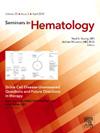The winding road: Infectious disease considerations for CAR-T and other novel adoptive cellular therapies in the era of COVID-19
IF 4.1
3区 医学
Q1 HEMATOLOGY
引用次数: 0
Abstract
Adoptive cellular therapies (ACT) are novel, promising treatments for life-threatening malignancies. In addition to the better known chimeric antigen receptor (CAR) T cells, ACTs include tumor infiltrating lymphocytes (TIL), cancer antigen-specific T cell receptors (TCRs), and CAR-NK (natural killer) cells. In key historic milestones, several adoptive therapies recently received FDA approvals, including 6 CAR-T products for the treatment of hematologic malignancies and the first TIL therapy for the treatment for metastatic melanoma. The rapid pace of clinical trials in the field and the discoveries they provide are ushering in a new era of cancer immunotherapy. However, the potential complications of these therapies are still not fully understood. In particular, patients receiving ACT may be at increased risk for severe infections due to immunocompromise resulting from their underlying malignancies, which are further compounded by the immune derangements that develop in the setting of cellular immunotherapy and/or the preconditioning treatment needed to enhance ACT efficacy. Moreover, these treatments are being readily implemented at a time following the height of the COVID-19 pandemic, and it remains unclear what additional risks these patients may face from SARS-CoV-2 and similar infections. Here, we examine the evidence for infectious complications with emerging adoptive therapies, and provide a focused review of the epidemiology, complications, and clinical management for COVID-19 in CAR-T recipients to understand the risk this disease may pose to recipients of other forms of ACT.
曲折的道路:COVID-19时代CAR-T和其他新型采纳性细胞疗法的传染病注意事项。
适应性细胞疗法(ACT)是治疗危及生命的恶性肿瘤的新型、有前途的疗法。除了众所周知的嵌合抗原受体(CAR)T 细胞外,ACT 还包括肿瘤浸润淋巴细胞(TIL)、癌症抗原特异性 T 细胞受体(TCR)和 CAR-NK(自然杀伤)细胞。在重要的历史里程碑中,几种采用疗法最近获得了美国食品及药物管理局(FDA)的批准,其中包括 6 种治疗血液恶性肿瘤的 CAR-T 产品和第一种治疗转移性黑色素瘤的 TIL 疗法。该领域临床试验的快速发展及其带来的新发现正在开创癌症免疫疗法的新时代。然而,人们对这些疗法的潜在并发症仍不完全了解。特别是,接受 ACT 治疗的患者可能会因基础恶性肿瘤导致的免疫功能低下而增加严重感染的风险,而细胞免疫疗法和/或提高 ACT 疗效所需的预处理疗法所产生的免疫失调又进一步加剧了这种风险。此外,这些治疗是在 COVID-19 大流行的高峰期后立即实施的,目前仍不清楚这些患者可能面临的 SARS-CoV-2 和类似感染的额外风险。在此,我们研究了新兴收养疗法感染并发症的证据,并重点回顾了CAR-T受者中COVID-19的流行病学、并发症和临床管理,以了解这种疾病可能给其他形式的ACT受者带来的风险。
本文章由计算机程序翻译,如有差异,请以英文原文为准。
求助全文
约1分钟内获得全文
求助全文
来源期刊

Seminars in hematology
医学-血液学
CiteScore
6.20
自引率
2.80%
发文量
30
审稿时长
35 days
期刊介绍:
Seminars in Hematology aims to present subjects of current importance in clinical hematology, including related areas of oncology, hematopathology, and blood banking. The journal''s unique issue structure allows for a multi-faceted overview of a single topic via a curated selection of review articles, while also offering a variety of articles that present dynamic and front-line material immediately influencing the field. Seminars in Hematology is devoted to making the important and current work accessible, comprehensible, and valuable to the practicing physician, young investigator, clinical practitioners, and internists/paediatricians with strong interests in blood diseases. Seminars in Hematology publishes original research, reviews, short communications and mini- reviews.
 求助内容:
求助内容: 应助结果提醒方式:
应助结果提醒方式:


